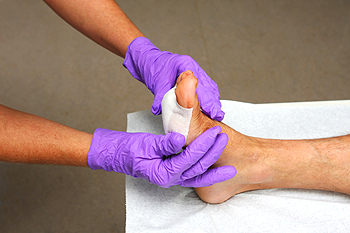
Diabetic foot ulcers pose a severe health threat, often triggered by peripheral neuropathy, which diminishes sensation and allows unnoticed injuries to progress. Compromised blood flow, a hallmark of diabetes, further delays healing and heightens infection risk. These ulcers are evaluated using detailed grading systems, guiding interventions such as surgical debridement to excise diseased tissue, advanced wound dressings to optimize healing, and off-loading techniques to alleviate pain. Infection control is of utmost importance, along with meticulous glycemic regulation to curb inflammation and promote recovery. Surgical intervention, including reconstruction or amputation, may become necessary in extreme cases. Prevention remains key to the management of diabetic foot ulcers. If you are diabetic, it is strongly suggested that you include a podiatrist on your healthcare team who can teach you about vigilant foot care, provide routine monitoring, and care for any foot problems before more severe complications arise.
Wound care is an important part in dealing with diabetes. If you have diabetes and a foot wound or would like more information about wound care for diabetics, consult with the foot specialists from Table Mountain Foot and Ankle. Our doctors will assess your condition and provide you with quality foot and ankle treatment.
What Is Wound Care?
Wound care is the practice of taking proper care of a wound. This can range from the smallest to the largest of wounds. While everyone can benefit from proper wound care, it is much more important for diabetics. Diabetics often suffer from poor blood circulation which causes wounds to heal much slower than they would in a non-diabetic.
What Is the Importance of Wound Care?
While it may not seem apparent with small ulcers on the foot, for diabetics, any size ulcer can become infected. Diabetics often also suffer from neuropathy, or nerve loss. This means they might not even feel when they have an ulcer on their foot. If the wound becomes severely infected, amputation may be necessary. Therefore, it is of the upmost importance to properly care for any and all foot wounds.
How to Care for Wounds
The best way to care for foot wounds is to prevent them. For diabetics, this means daily inspections of the feet for any signs of abnormalities or ulcers. It is also recommended to see a podiatrist several times a year for a foot inspection. If you do have an ulcer, run the wound under water to clear dirt from the wound; then apply antibiotic ointment to the wound and cover with a bandage. Bandages should be changed daily and keeping pressure off the wound is smart. It is advised to see a podiatrist, who can keep an eye on it.
If you have any questions, please feel free to contact our office located in Wheat Ridge, CO . We offer the newest diagnostic and treatment technologies for all your foot care needs.
